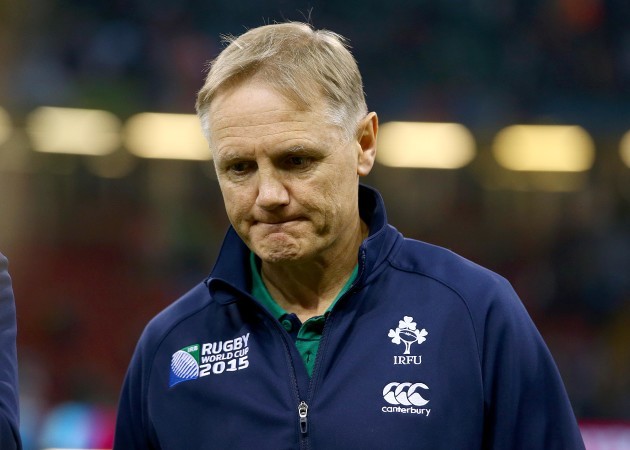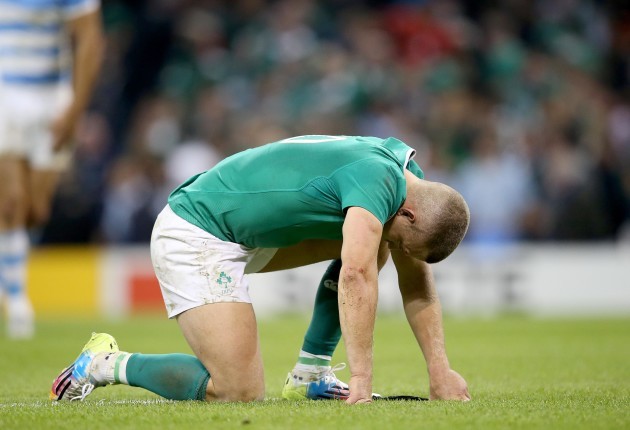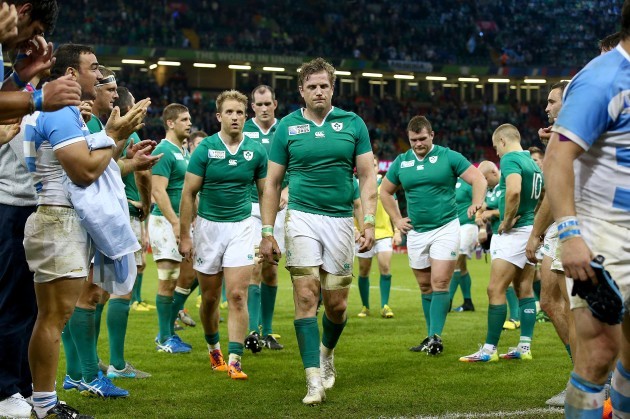Murray Kinsella reports from the Millennium Stadium
JOE SCHMIDT PUT a brave face on it, attempting to analyse the game in the detail he usually does, but his underlying disappointment was obvious.
As the Ireland head coached faced questions about the 43-20 defeat dished out by Daniel Hourcade’s brilliant Argentina in this World Cup quarter-final, the sound of Spanish singing burst into the room.
Just down the corridor, the Pumas were back in their changing room, still bouncing with the joyous energy of an impressive four-try win over Ireland.
Their wonderful brand of rugby made them difficult to live with, and for all of Schmidt’s side’s shortcomings, the Pumas were exceptional. Their tempo was frightening at times, their handling accuracy supreme and their ability to make decisions at pace crucial.
Less than 24 hours after New Zealand had blown France out of the water in the same stadium, another Rugby Championship side stretched a Six Nations outfit to breaking point.
Scotland’s agonising, unfair defeat to Australia confirmed that the semi-finals of this World Cup are a Rugby Championship shoot-out.
I think it is a real frustration, it would have been great if teams from both hemispheres could have progressed,” said Schmidt after Ireland’s defeat in the Millennium Stadium.
“Particularly because the tournament’s in the Northern Hemisphere, it would have been great for one of them to get through.”
Schmidt underlined that he doesn’t believe the divide between Northern and Southern Hemispheres is “a chasm,” but did admit that “we’ve got to be at our very best to be competitive.”
In Cardiff, it was clear exactly how much improvement the Pumas have made from being part of the Rugby Championship. No longer a forwards-orientated, defensive side, they played with a verve and skill that was beyond Ireland’s capability.
“The higher the level you play on a consistent basis, the higher a level you have to attain and you drive yourself towards that,” said Schmidt.
“I think it was evident the way the Pumas played so superbly in Durban, they did the same thing to the South Africans that they did to us today. We were very conscious that that was what they could potentially do and we had to be ready to stop that.
“While the players worked hard, we weren’t quite able to do so. Consistently playing the top-tier nations has had a great benefit for them, now with them having a Super Rugby franchise as well.
Those players will remain at home as opposed to playing in Europe and it’s probably going to make them even stronger. I don’t know that they need to get too much stronger to be a real threat at this World Cup.”
Whatever about the quality of the Argentinian performance, Ireland were poor. Their defence was as passive as it has been in years, as Schmidt’s players struggled to generate any linespeed in order to win the moments of contact.
The lack of decisiveness from Ireland’s defence was jarring throughout, as they not only failed to bring linespeed, but also struggled to drift to the touchline. They were caught in no man’s land far too often.
“It didn’t happen because we had two or three in the tackle to stop them. I think guys like Matera, Senatore and Lavanini, they were tending to win collisions,” said Schmidt in relation to the lack of linespeed. “We’d have one tackler, two tacklers, sometimes three tacklers and they’d be over the advantage line.
“Because we had to put more guys in that tackle, we were numbers down and if you’re numbers down it’s very hard to get off the line, because they’ll get space on the edge. They got that a couple of times.
“Unfortunately we probably lacked a little bit of acuity around the defence, because we had some guys still trying to go up and other guys going ‘we haven’t got enough bodies to do this with’. We were up and back and sideways, and they made the very most of that.
“It took us 15 or 20 minutes for Jamie to get the guys together a few times and unfortunately those huddles were behind the posts.
It was those huddles where we said ‘this is the plan, let’s try not to put so many in that first tackle, because we are putting pressure on ourselves.”
In a game where Ireland were missing several first-choice players, the loss of Tommy Bowe to injury in the first quarter was cruel. As it happened, Luke Fitzgerald was one of Ireland’s best players as Bowe’s replacement.
Schmidt said he wasn’t certain about the nature of Bowe’s injury post-match, but hinted at knee ligament damage.
“I’ve seen him in passing, only very, very briefly and he’s not sure what the injury is at all,” said Schmidt. “He doesn’t feel too bad right now, but he certainly wasn’t able to go on.
“I certainly think it’s a knee injury, it could be a ligament injury in the knee, but that’s supposition really because I haven’t had the opportunity to chat to him or the team doctor.”



